DAY 1 / WEDNESDAY, APRIL 27
QTPOC Liberation Lawn Party!

The Haus of Glitter is a Dance Company + Performance Lab + Preservation Society that works to shift the energetic center of the universe towards care, healing, justice and freedom. In the work we share, preserve and co-create with communities, we strive to embody ancestral liberation, healing and love in every step and every breath of our creative praxis. The Haus of Glitter Dance Company connects the individual human body to the collective human body. Our choreography aims to reach beyond the stage and into the streets; into our homes; into our institutions; into our hearts; and into the soil of the earth. [Photo Credit: Julio Berroa]
DAY 2 / THURSDAY, APRIL 28
Session 1 / The Burdens of Inheritance
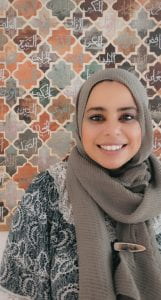
Dr. Sadia Habib is the Our Shared Cultural Heritage Coordinator at Manchester Museum, where she mentors young people to lead on critical and creative work around identities and belongings. Habib’s work revolves around making the Museum a better place for young people to explore identities and become active and vocal participants in organizational decision making. Habib has radically changed Manchester Museum by setting up a Young Collective: culturally diverse young people are now embedded in the Museum and regularly lead on activities, campaigns and events that reflect their communities and identities. Habib is winner of the Manchester Culture Award 2021 for Promotion of Social Justice and Equality, and was in the top three finalists for the Museums Association Radical Changemaker Award 2020. She is a Researcher in the Centre for Dynamics of Ethnicity at the University of Manchester and she is co-founder of The Riz Test.
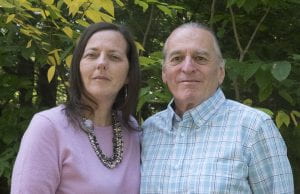
Denise K. Pouliot is the Sag8moskwa (Female Head Speaker) of the Cowasuck Band of the Pennacook Abenaki People and is an artist. She serves on the New Hampshire Commission on Native American Affairs, is a Federal Religious Advisor, the treasurer for COWASS North America and the Abenaki Nation of Vermont, and is a founding member of the Indigenous New Hampshire Collaborative Collective. Pouliot is an Affiliate Faculty member of the UNH Native American and Indigenous Studies Minor and recipient of the UNH Platinum Sustainability Award for community building in 2021. In her spare time she creates coil, bark or woven baskets and produces traditional ceremonial clothing. Paul W. Pouliot has been the Sag8mo or Chief Speaker for the Cowasuck Band of the Pennacook and Abenaki People and president of COWASS North America and the Abenaki Nation of Vermont since 1990. He is an Indigenous historian, lecturer, Federal Religious Advisor, and a founding member of the Indigenous New Hampshire Collaborative Collective and the New Hampshire Commission of Native American Affairs. He is also an Affiliate Faculty member of the UNH Native American and Indigenous Studies Minor and recipient of the UNH Platinum Sustainability Award for community building in 2021.

Jennifer A. Scott, a public historian, curator and anthropologist, has worked with a number of museums, historic sites and arts and cultural organizations for over 25 years. In 2021, Jennifer became Senior Vice President of Exhibitions and Programs at the Charles H. Wright Museum of African American History in Detroit, one of the nation’s most significant black history institutions. Prior to this appointment, she served for a year as co-chair of the new Chicago Monuments Project Advisory Committee. Appointed in 2020 by Chicago Mayor Lori E. Lightfoot, she helped to convene the commission to rethink the city’s monuments and public memorials and to create new public engagement opportunities and public art commissions. Before her civic work with the City of Chicago and State of Illinois, Jennifer served for nearly six years as Director and Chief Curator of Jane Addams Hull-House Museum, a historic landmark in Chicago that focuses on civil rights and human rights issues. She also served for a decade as the Vice Director and Director of Research at Weeksville Heritage Center, a museum and nationally significant historic site in Brooklyn, New York, that memorializes a Free Black, independent community in the 19thcentury. She serves on the boards of the Association of Midwest Museums, the National Association for Museum Exhibition and the National Council of Public History Editorial Board, and has served as faculty at the New School for Public Engagement in New York for more than twenty years.
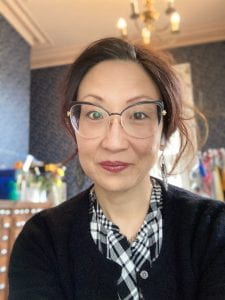
Panel Moderator: Mary-Kim Arnold is a writer, artist, and teacher. She is the author of The Fish & The Dove (Noemi Press, 2020) and Litany for the Long Moment (Essay Press, 2018). Other writings have appeared in Hyperallergic, Conjunctions, The Denver Quarterly, The Georgia Review, and elsewhere. Mary-Kim teaches in the Nonfiction Writing Program at Brown University. She is the recipient of a 2020 Howard Foundation Fellowship, the 2018 MacColl Johnson Fellowship, and the 2017 Fellowship in Fiction from the Rhode Island State Council on the Arts. She serves as Senior Editor for Collaborative & Cross-Disciplinary Texts at Tupelo Quarterly. Sheserves on the Board of the Providence Athenaeum and in 2021, was appointed to the Board of the Rhode Island State Council on the Arts.
Session 2 / Managing Change at Sites of National Heritage
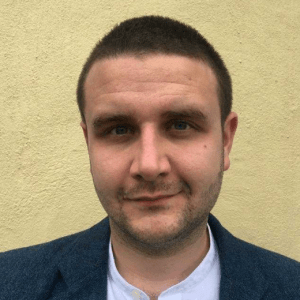 Alexander Lamont Bishop is Deputy Secretary-General at the International National Trusts Organisation (INTO) in London, UK. A keen linguist, Alexander has a background in the international heritage and development sector and is a passionate advocate for the person-centred value of heritage. In the role of Deputy Secretary-General, Alexander delivers the work of the Secretariat, which since 2007 has provided a network for international heritage organisations in over 60 countries and territories to work together for global conservation.
Alexander Lamont Bishop is Deputy Secretary-General at the International National Trusts Organisation (INTO) in London, UK. A keen linguist, Alexander has a background in the international heritage and development sector and is a passionate advocate for the person-centred value of heritage. In the role of Deputy Secretary-General, Alexander delivers the work of the Secretariat, which since 2007 has provided a network for international heritage organisations in over 60 countries and territories to work together for global conservation.
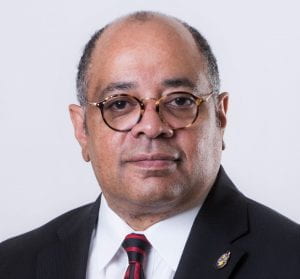 The Rev. Canon Leonard L. Hamlin Sr. was appointed the Canon Missioner of the Washington National Cathedral in March 2018 and also serves as the Minister of Equity and Diversity. Canon Hamlin oversees the Washington National Cathedral’s outreach and social justice initiatives, including gun violence prevention and racial justice and reconciliation. Canon Hamlin assists in developing relationships and the building of partnerships for the equipping of the Cathedral community and the congregation to serve in the local, regional and national communities. Canon Hamlin received his Bachelor of Business Administration Degree from the Howard University School of Business, Master of Divinity Degree, and a Doctor of Ministry Degree from the Howard University School of Divinity. He served as a Ford Foundation Research Fellow and is a recipient of the Benjamin E. Mays Scholarship for Education and Commitment to the ministry administered through the Fund for theological Education. Dr. Hamlin completed the (SLI) Summer Leadership Institute Continuing Education Program of the Harvard Divinity School, Cambridge, Massachusetts.
The Rev. Canon Leonard L. Hamlin Sr. was appointed the Canon Missioner of the Washington National Cathedral in March 2018 and also serves as the Minister of Equity and Diversity. Canon Hamlin oversees the Washington National Cathedral’s outreach and social justice initiatives, including gun violence prevention and racial justice and reconciliation. Canon Hamlin assists in developing relationships and the building of partnerships for the equipping of the Cathedral community and the congregation to serve in the local, regional and national communities. Canon Hamlin received his Bachelor of Business Administration Degree from the Howard University School of Business, Master of Divinity Degree, and a Doctor of Ministry Degree from the Howard University School of Divinity. He served as a Ford Foundation Research Fellow and is a recipient of the Benjamin E. Mays Scholarship for Education and Commitment to the ministry administered through the Fund for theological Education. Dr. Hamlin completed the (SLI) Summer Leadership Institute Continuing Education Program of the Harvard Divinity School, Cambridge, Massachusetts.
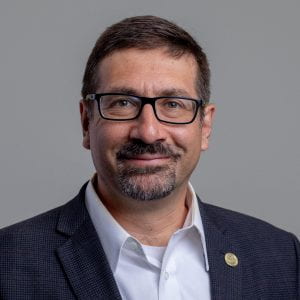
Raúl A. Ramos is an Associate Professor of History at the University of Houston with expertise in borderlands history, Mexican American history, and the history of Texas. He is the author of Beyond the Alamo: Forging Mexican Ethnicity in San Antonio, 1821-1861, published by UNC Press. He received his doctorate in History from Yale University with a focus on the American West.

Panel Moderator: Lauren Yapp is an anthropologist and archaeologist whose work explores the intersection of heritage preservation, urban activism, and public history. Her current research is based in Indonesia, where she does fieldwork in collaboration with activists, artists, curators, architects, and residents to understand how local communities grapple with the memory and materiality of the colonial past in their cities. Lauren earned her M.Phil in Archaeological Heritage and Museums from the University of Cambridge and her Ph.D in Anthropology from Stanford University. At Brown, she teaches and writes about postcolonial cities, memory politics, and urban heritage as a Lecturer and Director of Undergraduate Studies with the university’s Urban Studies Program.
Session 3 / Museums as Sites of Difficult History
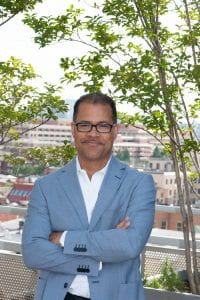 Marland Buckner is the Interim Executive Director of the Black History Museum and Cultural Center of Virginia and serves as Co-Founder and Principal of MB² Solutions LLC. Buckner served for seven years as Director of Federal Government Affairs for Microsoft Corporation in Washington, DC. From 1996 to 2001 Buckner served in several staff roles in the U.S. Congress, as Legislative Assistant to Senator Charles Schumer (D-NY) as well as Senior Policy Advisor and Chief of Staff to then-Congressman Harold Ford Jr. (D-TN-09). Buckner also served as a policy analyst at two Washington, DC based think tanks, the Joint Center for Political and Economic Studies and the Progressive Policy Institute. Buckner received his B.A in political science and history and his M.A in History from the University of Saskatchewan, Canada. He completed his doctoral examinations in American Studies at the College of William and Mary and holds a certificate in Business Administration from Georgetown University. He serves on the boards of the Valentine Museum, the Richmond Virginia Chapter of Communities in Schools; the Virginia Museum of Fine Arts, and the Reinvestment Fund, a Philadelphia based Community Development Financial Institution.
Marland Buckner is the Interim Executive Director of the Black History Museum and Cultural Center of Virginia and serves as Co-Founder and Principal of MB² Solutions LLC. Buckner served for seven years as Director of Federal Government Affairs for Microsoft Corporation in Washington, DC. From 1996 to 2001 Buckner served in several staff roles in the U.S. Congress, as Legislative Assistant to Senator Charles Schumer (D-NY) as well as Senior Policy Advisor and Chief of Staff to then-Congressman Harold Ford Jr. (D-TN-09). Buckner also served as a policy analyst at two Washington, DC based think tanks, the Joint Center for Political and Economic Studies and the Progressive Policy Institute. Buckner received his B.A in political science and history and his M.A in History from the University of Saskatchewan, Canada. He completed his doctoral examinations in American Studies at the College of William and Mary and holds a certificate in Business Administration from Georgetown University. He serves on the boards of the Valentine Museum, the Richmond Virginia Chapter of Communities in Schools; the Virginia Museum of Fine Arts, and the Reinvestment Fund, a Philadelphia based Community Development Financial Institution.
 Dr. Kelli Morgan is a curator, educator, and social justice activist who specializes in American art and visual culture. Her scholarly commitment to the investigation of anti-blackness within those fields has demonstrated how traditional art history and museum practice work specifically to uphold white supremacy. Besides her own curatorial experience, she mentor students, emerging curators, and regularly train staff at various museums to foster anti-racist approaches in collection building, exhibitions, community engagement, and fundraising. Over the past two years, Dr. Morgan has become a leading and influential voice in bolstering anti-racist work in art museums. Currently, she is a Professor of Practice and the inaugural Director of Curatorial Studies at Tufts University.
Dr. Kelli Morgan is a curator, educator, and social justice activist who specializes in American art and visual culture. Her scholarly commitment to the investigation of anti-blackness within those fields has demonstrated how traditional art history and museum practice work specifically to uphold white supremacy. Besides her own curatorial experience, she mentor students, emerging curators, and regularly train staff at various museums to foster anti-racist approaches in collection building, exhibitions, community engagement, and fundraising. Over the past two years, Dr. Morgan has become a leading and influential voice in bolstering anti-racist work in art museums. Currently, she is a Professor of Practice and the inaugural Director of Curatorial Studies at Tufts University.
 Troy Sebastian |nupqu ʔak·ǂam̓ is a writer from the Ktunaxa community of ʔaq̓am. He is a doctoral student, Vanier Scholar and Sessional Instructor in the University of Victoria’s Department of Writing. His story tax niʔ pikak̓— a long time ago- was longlisted for the 2018 CBC Short Story Prize and the 2019 Writers’ Trust Journey Prize. In 2020, he was selected as a Writer’s Trust Rising Star by Lynn Coady and longlisted for the CBC Poetry Prize. Troy is the former Indigenous Collections Curator at the Royal British Columbia Museum. He is represented by Rachel Letofsky at Cooke McDermid.
Troy Sebastian |nupqu ʔak·ǂam̓ is a writer from the Ktunaxa community of ʔaq̓am. He is a doctoral student, Vanier Scholar and Sessional Instructor in the University of Victoria’s Department of Writing. His story tax niʔ pikak̓— a long time ago- was longlisted for the 2018 CBC Short Story Prize and the 2019 Writers’ Trust Journey Prize. In 2020, he was selected as a Writer’s Trust Rising Star by Lynn Coady and longlisted for the CBC Poetry Prize. Troy is the former Indigenous Collections Curator at the Royal British Columbia Museum. He is represented by Rachel Letofsky at Cooke McDermid.

Panel Moderator: Stéphanie Larrieux is the Associate Director of the Center for the Study of Race and Ethnicity in America at Brown University. She studied Anthropology, French, and Film Studies as an undergraduate at Wesleyan University, and earned her M.A./Ph.D. in American Studies at Brown University. Her scholarly research and publications focus on race, class, and gender in American cinema and television. Presently, her work uses science fiction film to examine the relationship between imagined representations of the future and historical interpretations of racial and gendered discourses and social relations. Stéphanie is also an artist with training in a wide range of visual art modalities including filmmaking, photography, painting, and ceramics. She maintains an active independent artmaking practice inspired by her research interests and world travels.
DAY 3 / FRIDAY, APRIL 29
Session 4 / Artists and Counternarratives
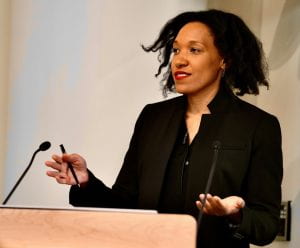 Jasmine Nichole Cobb is Professor of African & African American Studies and of Art, Art History and Visual Studies at Duke University, as well as a co-director of the “From Slavery to Freedom” (FS2F) Franklin Humanities Lab. A scholar of black cultural production and visual representation, Cobb is the author of two monographs, Picture Freedom: Remaking Black Visuality in the Early Nineteenth Century (NYUP 2015) and New Growth: The Art and Texture of Black Hair after Emancipation (Duke UP 2023). She is the editor for African American Literature in Transition, 1800-1830 (Cambridge UP) and she has written essays for Public Culture, MELUS: Multi-Ethnic Literature of the United States, and American Literary History. Her third monograph in progress, The Pictorial Life of Harriet Tubman, offers a visual history of the abolitionist, from the middle nineteenth century through the present, including the persistence of the abolitionist’s image in contemporary art and popular culture.
Jasmine Nichole Cobb is Professor of African & African American Studies and of Art, Art History and Visual Studies at Duke University, as well as a co-director of the “From Slavery to Freedom” (FS2F) Franklin Humanities Lab. A scholar of black cultural production and visual representation, Cobb is the author of two monographs, Picture Freedom: Remaking Black Visuality in the Early Nineteenth Century (NYUP 2015) and New Growth: The Art and Texture of Black Hair after Emancipation (Duke UP 2023). She is the editor for African American Literature in Transition, 1800-1830 (Cambridge UP) and she has written essays for Public Culture, MELUS: Multi-Ethnic Literature of the United States, and American Literary History. Her third monograph in progress, The Pictorial Life of Harriet Tubman, offers a visual history of the abolitionist, from the middle nineteenth century through the present, including the persistence of the abolitionist’s image in contemporary art and popular culture.
 Michelle D. Commander is an associate director and curator at the Schomburg Center for Research in Black Culture in Harlem, New York. Previously, she was a tenured associate professor of English and Africana Studies at the University of Tennessee. A Ford Foundation fellow and Fulbright scholar, Commander is the author of Afro-Atlantic Flight: Speculative Returns and the Black Fantastic (Duke University Press, 2017) and Avidly Reads Passages (NYU Press, 2021). She is also the editor of Unsung: Unheralded Narratives of American Slavery & Abolition (Penguin, 2021). Commander’s current book project Seizing Black Space is under contract with Viking. Recently, she served as the consulting curator for the Metropolitan Museum of Art’s exhibit Before Yesterday We Could Fly: An Afrofuturist Period Room, which is currently on view.
Michelle D. Commander is an associate director and curator at the Schomburg Center for Research in Black Culture in Harlem, New York. Previously, she was a tenured associate professor of English and Africana Studies at the University of Tennessee. A Ford Foundation fellow and Fulbright scholar, Commander is the author of Afro-Atlantic Flight: Speculative Returns and the Black Fantastic (Duke University Press, 2017) and Avidly Reads Passages (NYU Press, 2021). She is also the editor of Unsung: Unheralded Narratives of American Slavery & Abolition (Penguin, 2021). Commander’s current book project Seizing Black Space is under contract with Viking. Recently, she served as the consulting curator for the Metropolitan Museum of Art’s exhibit Before Yesterday We Could Fly: An Afrofuturist Period Room, which is currently on view.
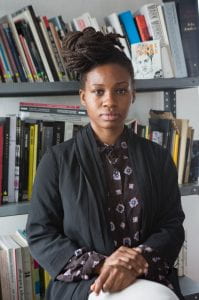
Jazzmen Lee-Johnson is a visual artist, scholar, composer, and curator. Her practice centers on the interplay of animation, printmaking, music, and dance, informed by a yearning to understand how our current circumstance is tethered to the trauma of the past. She received her BFA in Film, Animation, and Video at RISD, her MA in Public Humanities at Brown University, and a heavy dose of education working with youth in Baltimore, South Africa, New York City and Providence. She has curated exhibitions at the Chinese University of Hong Kong; Artist Proof Studio and the ABSA Art Gallery in Johannesburg, South Africa; RISD Museum; and Brown University Center for the Study of Slavery and Justice, where she was also a Public History of Slavery Fellow. As the 2019 inaugural Artist in Residence at the Rhode Island Department of Health she utilized the arts to confront health disparities. She was the 2020 Artist Fellow at the RISD Museum making work in response to the collection, and is currently working on a series called Contraband, which focuses on how the industry of slavery laid the blueprint for drug crimes, illicit economies, substance use disorder, and mass incarceration in Black communities, based on her research as artist fellow at the American Antiquarian Society. [Photograph by Livia Radwanski]
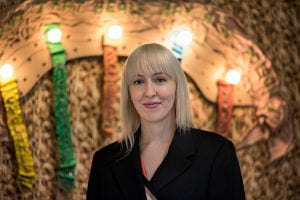 Panel Moderator: Kate Kraczon is Director of Exhibitions and Chief Curator at the David Winton Bell Gallery, Brown University, where she oversees the Brown Arts Institute’s exhibition program, which includes the Bell and its collection of over 7,000 works in List Art Center, the Cohen Gallery in the Granoff Center for the Creative Arts, and Brown’s robust Public Art program. Since joining the BAI, Kraczon has curated exhibitions with artists Savannah Knoop, Jules Gimbrone, Michele Cook and Hartman Deetz, and a two-person exhibition with Harry Gould Harvey IV and Faith Wilding (all 2021). In addition to her curatorial projects, Kraczon has overseen the final installation stages of major works by Sol LeWitt and Rebecca Warren on Brown’s campus this past year. Previously the Laporte Associate Curator at the Institute for Contemporary Art, University of Pennsylvania (2008-2019), she organized over thirty exhibitions while at ICA, including Ree Morton’s first major retrospective in the United States in over three decades (2018).
Panel Moderator: Kate Kraczon is Director of Exhibitions and Chief Curator at the David Winton Bell Gallery, Brown University, where she oversees the Brown Arts Institute’s exhibition program, which includes the Bell and its collection of over 7,000 works in List Art Center, the Cohen Gallery in the Granoff Center for the Creative Arts, and Brown’s robust Public Art program. Since joining the BAI, Kraczon has curated exhibitions with artists Savannah Knoop, Jules Gimbrone, Michele Cook and Hartman Deetz, and a two-person exhibition with Harry Gould Harvey IV and Faith Wilding (all 2021). In addition to her curatorial projects, Kraczon has overseen the final installation stages of major works by Sol LeWitt and Rebecca Warren on Brown’s campus this past year. Previously the Laporte Associate Curator at the Institute for Contemporary Art, University of Pennsylvania (2008-2019), she organized over thirty exhibitions while at ICA, including Ree Morton’s first major retrospective in the United States in over three decades (2018).
Session 5 / Law, Policy, and the Levers of Change
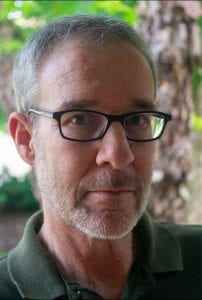 Rusty Antel is an attorney in Boone County, Missouri. He received his B.A. from the University of Pennsylvania in 1976, his J.D. from the University of Missouri School of Law in 1981, and that year was licensed to practice law in Missouri. From 1981 to 1990, Antel was an Assistant Prosecuting Attorney in Boone County, and since 1990 has been partner in the private law practice, Walther Antel & Stamper, where his primary area of practice is criminal defense. In 2016, Antel received the Missouri Bar Association Community Service Award.
Rusty Antel is an attorney in Boone County, Missouri. He received his B.A. from the University of Pennsylvania in 1976, his J.D. from the University of Missouri School of Law in 1981, and that year was licensed to practice law in Missouri. From 1981 to 1990, Antel was an Assistant Prosecuting Attorney in Boone County, and since 1990 has been partner in the private law practice, Walther Antel & Stamper, where his primary area of practice is criminal defense. In 2016, Antel received the Missouri Bar Association Community Service Award.
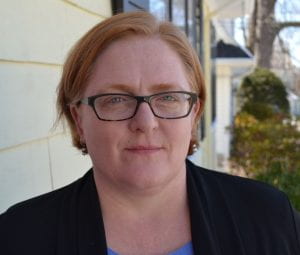
Lisa Dady is the Executive Director of Historic Newton, where she oversees two museums, one of which was a stop on the Underground Railroad, and three historic burying grounds. She has served in curatorial roles (collections management and exhibit development), education and public programming, and operations. After receiving a B.A. in Human Development and Social Relations, Dady had a ten-year social services career in Seattle, before switching gears to earn a graduate degree in Museum Studies from the Cooperstown Graduate Program. She has worked for the Newport Restoration Foundation, the Rhode Island Historical Society, and the Culinary Archives and Museum in Rhode Island, and was for several semesters an adjunct Art History professor at Salve Regina University.
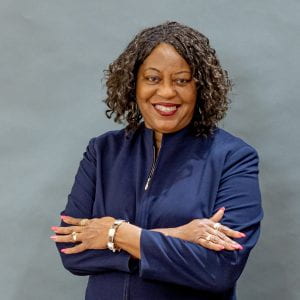 Commissioner Mereda Davis Johnson has been a long-time resident of South DeKalb County, Georgia for over thirty years. She has been a practicing attorney for more than 30 years, concentrating in family law, and in 1985, she became the first black female judge appointed in DeKalb County Courts. Commissioner Johnson is a co-founding partner of Johnson Hopewell Coleman, LLC. She holds a B.A. and an M.A. from Tennessee State University. She obtained her J.D. from the Thurgood Marshall School of Law at Texas Southern University in Houston, where she met her law and life partner, Congressman Hank Johnson. Commissioner Johnson is a co-founder and past president of the DeKalb Lawyers Association, and is a former Board Member of the Congressional Black Caucus Foundation, Inc., the Congressional Spouses Club, and the Congressional Black Caucus Spouses, where she served as chair for four years. In 2020, Commissioner Johnson convened the John Lewis Commemorative Task Force to honor the life and legacy of Congressman John Lewis in DeKalb County, Georgia.
Commissioner Mereda Davis Johnson has been a long-time resident of South DeKalb County, Georgia for over thirty years. She has been a practicing attorney for more than 30 years, concentrating in family law, and in 1985, she became the first black female judge appointed in DeKalb County Courts. Commissioner Johnson is a co-founding partner of Johnson Hopewell Coleman, LLC. She holds a B.A. and an M.A. from Tennessee State University. She obtained her J.D. from the Thurgood Marshall School of Law at Texas Southern University in Houston, where she met her law and life partner, Congressman Hank Johnson. Commissioner Johnson is a co-founder and past president of the DeKalb Lawyers Association, and is a former Board Member of the Congressional Black Caucus Foundation, Inc., the Congressional Spouses Club, and the Congressional Black Caucus Spouses, where she served as chair for four years. In 2020, Commissioner Johnson convened the John Lewis Commemorative Task Force to honor the life and legacy of Congressman John Lewis in DeKalb County, Georgia.
 Panel Moderator: Renée Ater, Provost Visiting Associate Professor in Africana Studies at Brown University, holds a B.A. from Oberlin College, and an M.A. and Ph.D. in Art History from the University of Maryland. A public scholar wo works at the intersection of art and history, Ater’s research focuses on monuments, memory, race and public space. She is the author of Keith Morrison, volume 5 of The David C. Driskell Series of African American Art (Pomegranate Books, 2005) and Remaking Race and History: The Sculpture of Meta Warrick Fuller (University of California Press, 2011; 2021 pbk). She has also written on a range of public monuments including the Unsung Founders Memorial at the University of North Carolina; the African American Civil War Memorial in Washington, DC; and the Unwavering Courage in the Pursuit of Freedom memorial dedicated to Harriet Tubman and Thomas Garrett in Wilmington, Delaware. Currently, Dr. Ater is designing the born-digital project, Contemporary Monuments to the Slave Past in Omeka, and writing a digital publication entitled Memoryscapes of Slavery in collaboration with the Digital Publication Initiative at Brown University.
Panel Moderator: Renée Ater, Provost Visiting Associate Professor in Africana Studies at Brown University, holds a B.A. from Oberlin College, and an M.A. and Ph.D. in Art History from the University of Maryland. A public scholar wo works at the intersection of art and history, Ater’s research focuses on monuments, memory, race and public space. She is the author of Keith Morrison, volume 5 of The David C. Driskell Series of African American Art (Pomegranate Books, 2005) and Remaking Race and History: The Sculpture of Meta Warrick Fuller (University of California Press, 2011; 2021 pbk). She has also written on a range of public monuments including the Unsung Founders Memorial at the University of North Carolina; the African American Civil War Memorial in Washington, DC; and the Unwavering Courage in the Pursuit of Freedom memorial dedicated to Harriet Tubman and Thomas Garrett in Wilmington, Delaware. Currently, Dr. Ater is designing the born-digital project, Contemporary Monuments to the Slave Past in Omeka, and writing a digital publication entitled Memoryscapes of Slavery in collaboration with the Digital Publication Initiative at Brown University.
Session 6 / Looking Back, Looking Ahead
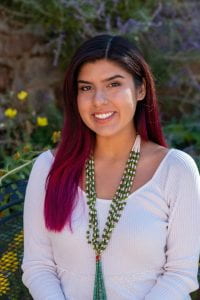 Sháńdíín Brown is a jeweler, Native American Art professional, and citizen of the Navajo Nation. She currently works full-time as the Henry Luce Curatorial Fellow for Native American Art at the Rhode Island School of Design Museum. She is a graduate of Dartmouth College, where she earned her Bachelor of Arts majoring in Anthropology as well as Native American Studies and minoring in Environmental Studies. Previously she has held positions at the Heard Museum, Hood Museum of Art, IAIA Museum of Contemporary Native Arts, and School for Advanced Research Indian Arts Research Center.
Sháńdíín Brown is a jeweler, Native American Art professional, and citizen of the Navajo Nation. She currently works full-time as the Henry Luce Curatorial Fellow for Native American Art at the Rhode Island School of Design Museum. She is a graduate of Dartmouth College, where she earned her Bachelor of Arts majoring in Anthropology as well as Native American Studies and minoring in Environmental Studies. Previously she has held positions at the Heard Museum, Hood Museum of Art, IAIA Museum of Contemporary Native Arts, and School for Advanced Research Indian Arts Research Center.
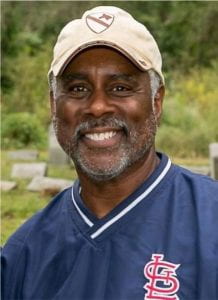 Raphael Morris, Board President of Greenwood Cemetery Preservation Association. Raphael started his career at Monsanto and worked for over 36 years in the agrochemical, agricultural, and pharmaceutical industries, retiring in 2015 from ICL. As an Alderman for Pagedale, Missouri, he served his community for four terms. He continues to serve the St Louis area as Chair of Greenwood Cemetery Preservation Assoc. Raphael has made it his mission to help restore Greenwood Cemetery to a place of honor. 2019 Recipient of Mission St Louis: Neighbors of the Year Award. Raphael is married and a father of eight children and 13 grandchildren.
Raphael Morris, Board President of Greenwood Cemetery Preservation Association. Raphael started his career at Monsanto and worked for over 36 years in the agrochemical, agricultural, and pharmaceutical industries, retiring in 2015 from ICL. As an Alderman for Pagedale, Missouri, he served his community for four terms. He continues to serve the St Louis area as Chair of Greenwood Cemetery Preservation Assoc. Raphael has made it his mission to help restore Greenwood Cemetery to a place of honor. 2019 Recipient of Mission St Louis: Neighbors of the Year Award. Raphael is married and a father of eight children and 13 grandchildren.
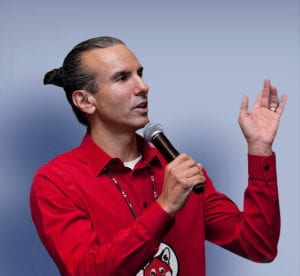 Dr. Anton Treuer, Leech Lake Ojibwe, is Professor of Ojibwe at Bemidji State University. He has a B.A. from Princeton University and a Ph.D. from the University of Minnesota. He is Editor of the Oshkaabewis Native Journal, the only academic journal of the Ojibwe language. Dr. Treuer has received awards and fellowships from the American Philosophical Society, the National Endowment for the Humanities, the National Science Foundation, the MacArthur Foundation, the Bush Foundation, and the John Simon Guggenheim Foundation. His published works include Everything You Wanted to Know About Indians But Were Afraid to Ask, The Language Warrior’s Manifesto: How to Keep Our Languages Alive No Matter the Odds, The Cultural Toolbox: Traditional Ojibwe Living in the Modern World, Warrior Nation: A History of the Red Lake Ojibwe (Winner of Caroline Bancroft History Prize and the American Association of State and Local History Award of Merit), Ojibwe in Minnesota (“Minnesota’s Best Read for 2010” by The Center for the Book in the Library of Congress), The Assassination of Hole in the Day (Award of Merit Winner from the American Association for State and Local History), Atlas of Indian Nations, The Indian Wars: Battles, Bloodshed, and the Fight for Freedom on the American Frontier, and Awesiinyensag (“Minnesota’s Best Read for 2011” by The Center for the Book in the Library of Congress). Treuer is on the governing board for the Minnesota State Historical Society. In 2018, he was named Guardian of Culture and Lifeways and recipient of the Pathfinder Award by the Association of Tribal Archives, Libraries, and Museums.
Dr. Anton Treuer, Leech Lake Ojibwe, is Professor of Ojibwe at Bemidji State University. He has a B.A. from Princeton University and a Ph.D. from the University of Minnesota. He is Editor of the Oshkaabewis Native Journal, the only academic journal of the Ojibwe language. Dr. Treuer has received awards and fellowships from the American Philosophical Society, the National Endowment for the Humanities, the National Science Foundation, the MacArthur Foundation, the Bush Foundation, and the John Simon Guggenheim Foundation. His published works include Everything You Wanted to Know About Indians But Were Afraid to Ask, The Language Warrior’s Manifesto: How to Keep Our Languages Alive No Matter the Odds, The Cultural Toolbox: Traditional Ojibwe Living in the Modern World, Warrior Nation: A History of the Red Lake Ojibwe (Winner of Caroline Bancroft History Prize and the American Association of State and Local History Award of Merit), Ojibwe in Minnesota (“Minnesota’s Best Read for 2010” by The Center for the Book in the Library of Congress), The Assassination of Hole in the Day (Award of Merit Winner from the American Association for State and Local History), Atlas of Indian Nations, The Indian Wars: Battles, Bloodshed, and the Fight for Freedom on the American Frontier, and Awesiinyensag (“Minnesota’s Best Read for 2011” by The Center for the Book in the Library of Congress). Treuer is on the governing board for the Minnesota State Historical Society. In 2018, he was named Guardian of Culture and Lifeways and recipient of the Pathfinder Award by the Association of Tribal Archives, Libraries, and Museums.
Panel Moderator: Kenvi Phillips, Director of Diversity, Equity and Inclusion, Brown University Libraries
Artwork credit, web banner: Detail, Jazzmen Lee-Johnson, Not Never More (2022)
